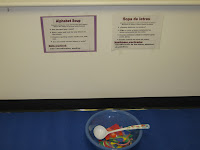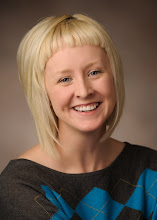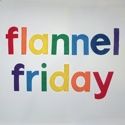We are all about working closely with the Fayette County Schools at the Lexington Public Library to promote Kindergarten readiness - sharing with families the skills their kids need to be successful when they start school, and modeling fun, interactive ways in which they can practice this at home. Last year, a colleague of mine, Susan Price at the Central Location, took this mission and used it to develop a brilliant program called "When I'm in Kindergarten." This is a discovery center style program, much like "Little Hands, Big Ideas / Manos pequeñas / Ideas grandes." In every station, parent and child explore important Kindergarten readiness and pre-literacy skills, such as their personal information, parts of the body, practicing numbers, sorting objects by color and size and alphabet letters. Last year I translated this program, and we have offered it twice so far at the Villlage Branch. With Susan's permission, in this post I will share all of the materials you need to put this program on bilingually at your library too! The instructions for the walls are available in English and in Spanish. However, both were originally created in Microsoft Publisher, so to access via Google Docs, you will need to download and open with Publisher. If this is a problem for any reason, please feel free to contact me via the blog and I can email to you as an attachment.
- Patterns / Sequencias
 In this station, foam shapes are set out on a mat. We use the Mother Goose Foam Shape and Pattern Blocks, but this could also be done on the cheap with paper cutouts. Parents work with the child to identify the various shapes and their colors. The caregiver then helps the child construct the patterns depicted in the instructions, and the child predicts which shapes will come next to continue the pattern. Children who master this can then be challenged to create and extend their own patterns. This stations helps develop Letter Knowledge by practicing shapes, as well as the Kindergarten readiness skills of identifying shapes and colors and extending simple patterns.
In this station, foam shapes are set out on a mat. We use the Mother Goose Foam Shape and Pattern Blocks, but this could also be done on the cheap with paper cutouts. Parents work with the child to identify the various shapes and their colors. The caregiver then helps the child construct the patterns depicted in the instructions, and the child predicts which shapes will come next to continue the pattern. Children who master this can then be challenged to create and extend their own patterns. This stations helps develop Letter Knowledge by practicing shapes, as well as the Kindergarten readiness skills of identifying shapes and colors and extending simple patterns.
2. Telephone / Teléfono
 This is probably my favorite station! Large numbers are laminated and glued to a mat in the shape of a phone pad. The caregiver helps the child practice important phone numbers (such as home, cell and 911) by hopping from number to number!
This is probably my favorite station! Large numbers are laminated and glued to a mat in the shape of a phone pad. The caregiver helps the child practice important phone numbers (such as home, cell and 911) by hopping from number to number!
3. Laundary / Lavando la ropa
This station practices sorting objects by various attributes, such as color and shape. A small clothesline is hung to the wall to which children can clip laminated paper cutouts of articles of clothing in assorted colors. For example, they can group all of the shirts, or all of the red clothes.
4. Body Parts / Partes del cuerpo
 Another important station! Susan made and laminated a large cutout of a child. The names of various body parts are laminated and attached to magnets which correspond to magnets on the body parts too. Children match the name to the appropriate area of the body. This activity would be fun to include in a body or movement themed storytime. You could follow up with a movement song that practices body parts, such as "Head, Shoulders, Knees and Toes" or "Juanito."
Another important station! Susan made and laminated a large cutout of a child. The names of various body parts are laminated and attached to magnets which correspond to magnets on the body parts too. Children match the name to the appropriate area of the body. This activity would be fun to include in a body or movement themed storytime. You could follow up with a movement song that practices body parts, such as "Head, Shoulders, Knees and Toes" or "Juanito." Through this activity, children and caregivers go over important personal information children need to know, particularly in the event of an emergency, such as family members' names, address and birthday. Parents review this information with their child in the form of a mad lib (available in English and Spanish). They also use dry erase markers to complete the missing information from the drawn and laminated house.
Through this activity, children and caregivers go over important personal information children need to know, particularly in the event of an emergency, such as family members' names, address and birthday. Parents review this information with their child in the form of a mad lib (available in English and Spanish). They also use dry erase markers to complete the missing information from the drawn and laminated house.
6. Alphabet Soup / La sopa de letras
 At this station, children find a big bowl of letter soup, made from paper letters, cut and laminated. Caregivers help children find the letters in their names and dip out the whole alphabet in order.
At this station, children find a big bowl of letter soup, made from paper letters, cut and laminated. Caregivers help children find the letters in their names and dip out the whole alphabet in order.
In order to continue the fun and learning outside of the library, Susan also made two take-home activities: an obstacle course and a grocery hunt. We are sure to also share with parents the information from FCPS regarding what children are expected to know as they enter Kindergarten.
Let me know if you use any or all of these stations to supplement storytimes or create new programs. Do you have other Kindergarten readiness programming ideas? Share them here / compártanlos aquí!



